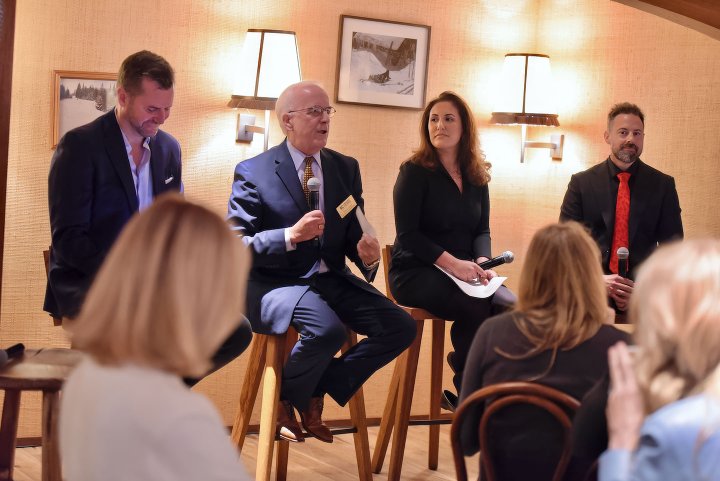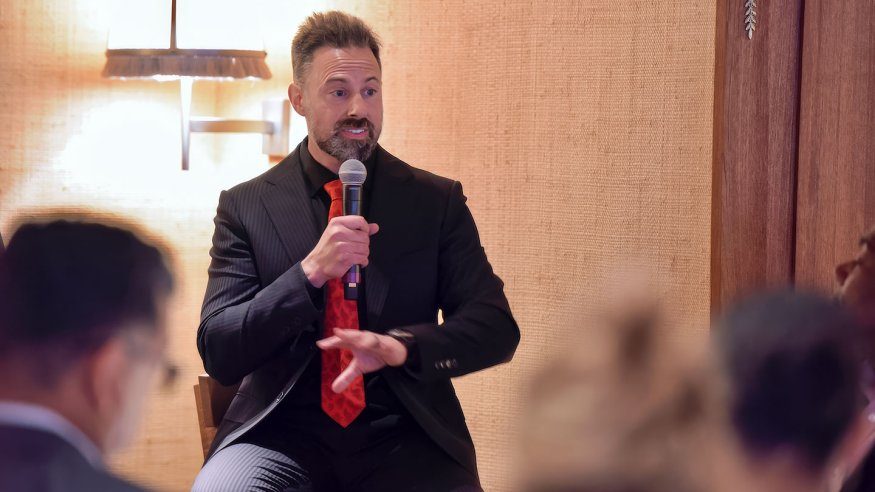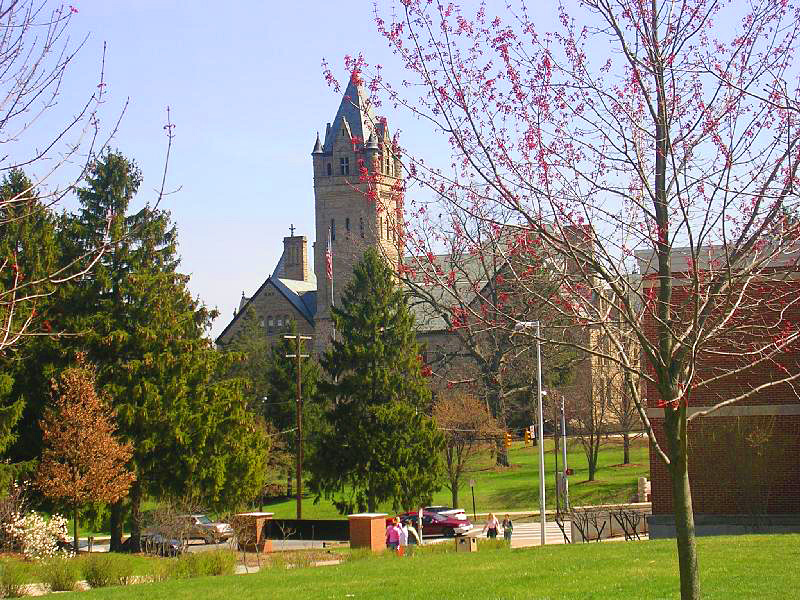By Cole Hatcher
When leaders gathered for the United Nations General Assembly (UNGA) 2024 forum to discuss issues of global significance, they invited Ohio Wesleyan University President Matt vandenBerg to the table.
vandenBerg, Ed.D., participated Sept. 24 in discussions exploring “Inclusion for All: From Learning to Leading” held at L’Avenue at Saks in New York City. Described by organizers as “the year’s most significant international convening of inclusive education and inclusive workplaces,” UNGA 2024 brought together global leaders from government, civil society, international NGOs, and the private sector to discuss how to create more accessible and inclusive experiences in primary and secondary education, higher education, and workplaces.
“When it comes to creating an accessible and inclusive student experience, Ohio Wesleyan is leading with innovation, boldness, confidence, and kindness,” vandenBerg says. “We just welcomed a significantly larger class of new students – the most diverse class in our 182-year history – and we continue to see surging retention and student outcomes. Ohio Wesleyan is a trailblazer on some of the most pressing issues in higher education, and global leaders are taking notice.”
At UNGA 2024, vandenBerg’s panel focused on “Accessibility and the redefinition of student success in postsecondary education.”

Recalibrating Student Success
During the discussion, moderator Gus Schmedlen of Texthelp Inc. addressed issues including how to recalibrate student success in college to prize inclusion and how, through this lens, to prepare future leaders for success in the workplace.
In response, vandenBerg stresses that today’s college and university leaders need to be “brave innovators and change makers, not maintainers of the status quo.”
“Unlike what some people say, we don’t need less college. We need better college,” vandenBerg says. “We need college to become radically more inclusive and focused on getting students where they need to go.”
A Life-Changing ‘Promise’
At Ohio Wesleyan, he says, the university is “laser-focused on democratizing access to a national liberal arts education” noting, as an example, OWU’s new Delaware County Promise program.
The program provides free tuition to any Delaware County, Ohio, high school graduate who has achieved a GPA of 3.5 or higher and whose family earns $100,000 or less per year. This fall, 12 students enrolled through the Delaware County Promise program.
“We’re excited to lead the change we want to see in higher education,” vandenBerg says.
More Than a Transaction
Panel moderator Schmedlen also asked vandenBerg at UNGA 2024 to address how liberal arts institutions, such as Ohio Wesleyan, are building inclusive environments that prepare students for personal and professional growth.
In response, vandenBerg says higher education as a whole needs to put less pressure on 17- and 18-year-olds to “have it all figured out.”
“We ask them to pick a major at that early stage – and to use that hypothesis to select a college,” vandenBerg says. “Students are made to think their major is their identity and the key to getting them that first job. And they had better choose well because college isn’t cheap. Sound familiar? …
“But here’s the thing, 80% of all students – four out of every five – change their major at least once. That means a lot of them are picking colleges for the wrong reasons,” vandenBerg continues. “We know from national graduation rates that our system doesn’t work well enough. Let’s recalibrate. For many students, college shouldn’t be a transaction. It should be a transition into full-blown adulthood and career readiness.”
‘A Better Way to Do College’
“At OWU, we think there’s a better way to do college,” vandenBerg asserts. “So, we work with students differently in a few ways.”
This includes having each student begin their OWU career as an undeclared major. “And when – not if – but when a student tries on a major for size and discovers it’s not for them, they won’t have wasted any time, effort, or money,” vandenBerg explains.
In addition, Ohio Wesleyan is responding to employers who routinely state that for most jobs, “the major doesn’t really matter.” What’s really important is the degree and the skill set new graduates bring to the table.
Ohio Wesleyan calls such employer-desired abilities “power skills,” vandenBerg says, “because they’re the tools that make you powerful in the workforce – like how to write and speak persuasively, how to solve tough problems, how to work with diverse groups of people, and how to understand and apply context.”
Addressing Challenges
In the final analysis, vandenBerg says, “Ohio Wesleyan is on a mission to address some of the most vexing challenges in higher education around equity and access. And we make that happen by working with partners to create pathways that meet students where they are and deliver them where they want to go.”
Additional examples of this work, he says, include:
- Collaborations with Columbus State Community College, including a Preferred Pathway program that allows Columbus State graduates to enroll at OWU as juniors with a clear path to earning their bachelor’s degrees in 20 majors and the Tuition Now program, which enables up to 25 Columbus State graduates a year who earned a 3.5 GPA or higher to pay the Columbus State tuition rate to complete their OWU degrees.
- A sister school agreement with South Carolina-based Claflin University that has been called one of the most comprehensive such agreements in the country between a Historically Black College and University (HBCU) and a Predominantly White Institution (PWI). “We’re creating revolutionary new student and faculty exchange opportunities and possibly even some 2+2 arrangements,” vandenBerg says.
Reducing Barriers
But are Ohio Wesleyan’s efforts producing the desired changes in access and inclusivity?
“We’re encouraged with the outcomes,” vandenBerg says. “Thanks to these and many other efforts to reduce barriers to success, Ohio Wesleyan is becoming more diverse, and our retention and student outcomes have risen for four years in a row. Our first-to-second-year retention is now 85%.
“Students are choosing to come here, and they are fitting in and succeeding here,” he concludes. “It’s exciting to watch them flourish and then to take their educations, academic passions, and abilities into the world.”
Joining vandenBerg for the Sept. 26 UNGA 2024 higher education panel discussion were Ana Homayoun, founder and CEO of Green Ivy Educational Consulting LLC, and Tom Looney, chair of the State Board of North Carolina Community Colleges.
Other leaders participating in the global forum included both the director and the deputy director of the Center for Universal Education at The Brookings Institution, the assistant secretary in the Office of Special Education and Rehabilitative Services at the U.S. Department of Education, the chancellor of New York City Public Schools, and more.
In closing the event, Texthelp’s Schmedlen stated: “Everyone, everywhere – regardless of socio-economic status, location, local language fluency, or disability – should have access to the tools, supports, and resources to help them be included across all stages of life. These powerful tools of inclusion are necessary for some, but beneficial to all.”
Learn more about work being done to support Ohio Wesleyan students at owu.edu and more about enrollment, at owu.edu/admission.
Cover Photo: Ohio Wesleyan University President Matt vandenBerg participates on a panel of experts at the United Nations General Assembly (UNGA) 2024 forum. The Sept. 24 panel discussed how to create more inclusive experiences in schools and workplaces. (Photos courtesy of Texthelp Inc.)
Source, Photos: OWU









